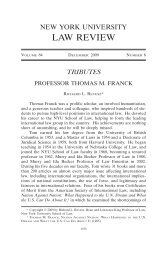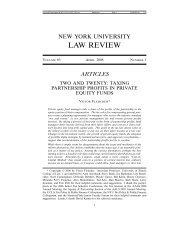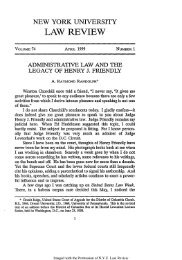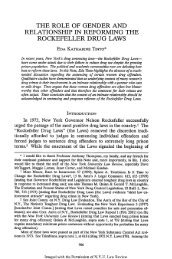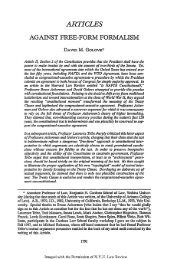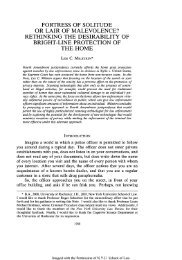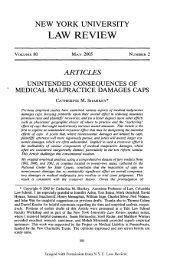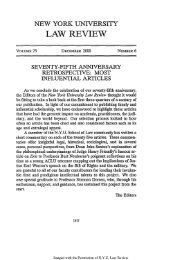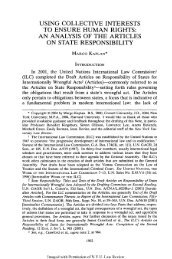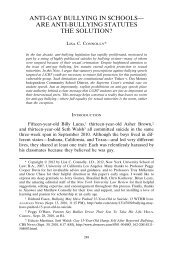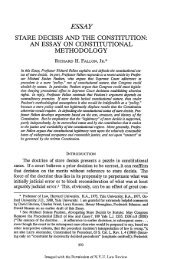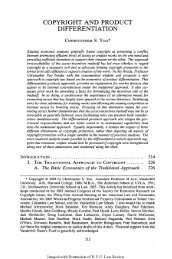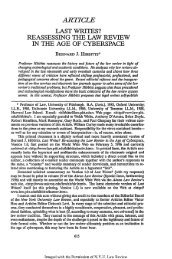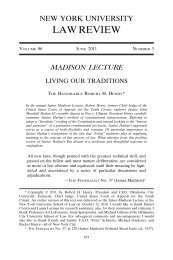Immigrants and the Right to Petition - NYU Law Review
Immigrants and the Right to Petition - NYU Law Review
Immigrants and the Right to Petition - NYU Law Review
Create successful ePaper yourself
Turn your PDF publications into a flip-book with our unique Google optimized e-Paper software.
Imaged with <strong>the</strong> Permission of N.Y.U. School of <strong>Law</strong><br />
NEW YORK UNIVERSITY LAW REVIEW<br />
[Vol. 78:667<br />
Many noncitizens petitioned Congress for compensation for <strong>the</strong>ir<br />
wartime contributions. 89 In fact, <strong>the</strong> first <strong>and</strong> third private bills enacted<br />
by <strong>the</strong> First Congress were in response <strong>to</strong> petitions by German<br />
war veterans, 190 <strong>and</strong> <strong>the</strong> fifth private bill was enacted in response <strong>to</strong><br />
<strong>the</strong> petition of a "Canadian sufferer or refugee."' 191 Ano<strong>the</strong>r early petition<br />
that provoked extensive congressional debate, this time by <strong>the</strong><br />
Third Congress, sought assistance for French refugees from Haiti who<br />
had fled political unrest <strong>and</strong> l<strong>and</strong>ed in Baltimore. 192<br />
The following are brief his<strong>to</strong>ries of three early petitions by noncitizens,<br />
each of which resulted in enactment of a private bill. The<br />
strength of <strong>the</strong>se petitioners' connections <strong>to</strong> <strong>the</strong> national community<br />
are varied. At one extreme is <strong>the</strong> Baron de Glaubeck, a German soldier<br />
who fought in <strong>the</strong> Revolutionary War, departed for Europe upon<br />
<strong>the</strong> cessation of hostilities, <strong>and</strong> later returned <strong>to</strong> <strong>the</strong> United States in<br />
order <strong>to</strong> petition for a financial award. At <strong>the</strong> o<strong>the</strong>r end are French<br />
refugees from Haiti, who arrived in Baltimore in 1793 <strong>and</strong> petitioned<br />
immediately, despite having no ties <strong>to</strong> <strong>the</strong> United States whatsoever.<br />
Between <strong>the</strong>se, on <strong>the</strong> spectrum of ties <strong>to</strong> <strong>the</strong> national community, are<br />
<strong>the</strong> de Grasse daughters, who came <strong>to</strong> <strong>the</strong> United States from France,<br />
destitute <strong>and</strong> without personal connections <strong>to</strong> <strong>the</strong> country, but who<br />
petitioned for assistance on <strong>the</strong> strength of <strong>the</strong>ir deceased fa<strong>the</strong>r's<br />
wartime contributions. Their ties <strong>to</strong> <strong>the</strong> national community, while<br />
weaker than those of Glaubeck, were arguably greater than those of<br />
<strong>the</strong> French refugees from Haiti. Despite <strong>the</strong> many objections raised <strong>to</strong><br />
each of <strong>the</strong>se eventually successful petitions, <strong>the</strong> Verdugo-Urquidez<br />
189 Among <strong>the</strong> first petitions submitted, for example, were applications from French veterans.<br />
Id. at xxv; 7 Documentary His<strong>to</strong>ry, supra note 104, at xv & n.4 (describing failed<br />
petition of French volunteer Louis-Pierre Penot Lombart, chevalier de la Neuville).<br />
190 See Act of Sept. 29, 1789, ch. 26, 6 Stat. I (allowing Baron de Glaubeck pay of<br />
Captain in Army of United States); see also Act of June 4, 1790, ch. 16, 6 Stat. 2 (adjusting<br />
<strong>and</strong> satisfying <strong>the</strong> claims of Frederick William von Steuben). Steuben was regularly termed<br />
a "foreigner," though in fact he had naturalized under <strong>the</strong> laws of New York by <strong>the</strong> time he<br />
petitioned <strong>the</strong> First Congress. See infra note 204.<br />
191 H. Journal, 1st Cong., 2d Sess. 232 (1790). John McCord was a native of Nor<strong>the</strong>rn<br />
Irel<strong>and</strong> who came <strong>to</strong> Quebec before <strong>the</strong> Revolution. His petition <strong>to</strong> <strong>the</strong> First Congress<br />
sought reimbursement for supplies provided <strong>to</strong> <strong>the</strong> American army in Canada, 7 Documentary<br />
His<strong>to</strong>ry, supra note 104, at 76-78, <strong>and</strong> resulted in enactment of a private bill settling<br />
his account <strong>and</strong> granting a fur<strong>the</strong>r sum in satisfaction of his claims "for l<strong>and</strong>s <strong>and</strong><br />
rations granted by several resolutions of Congress <strong>to</strong> Canadian sufferers." Act of July 1,<br />
1790, ch. 23, 6 Stat. 2 (satisfying claims of John McCord against United States). William<br />
Maclay, a member of <strong>the</strong> Senate committee examining McCord's petition, initially believed<br />
that McCord's "claims [did] not seem over well founded in point of law or any act of<br />
Congress"; but Maclay eventually expressed "no difficulty in allowing" McCord <strong>the</strong> sum,<br />
as "[hie had suffered greatly in Canada." Journal of William Maclay 287, 298 (Edgar S.<br />
Maclay ed., N.Y., J.D. Apple<strong>to</strong>n & Co. 1890) [hereinafter Maclay Journal].<br />
192 See infra notes 205-29 <strong>and</strong> accompanying text.



